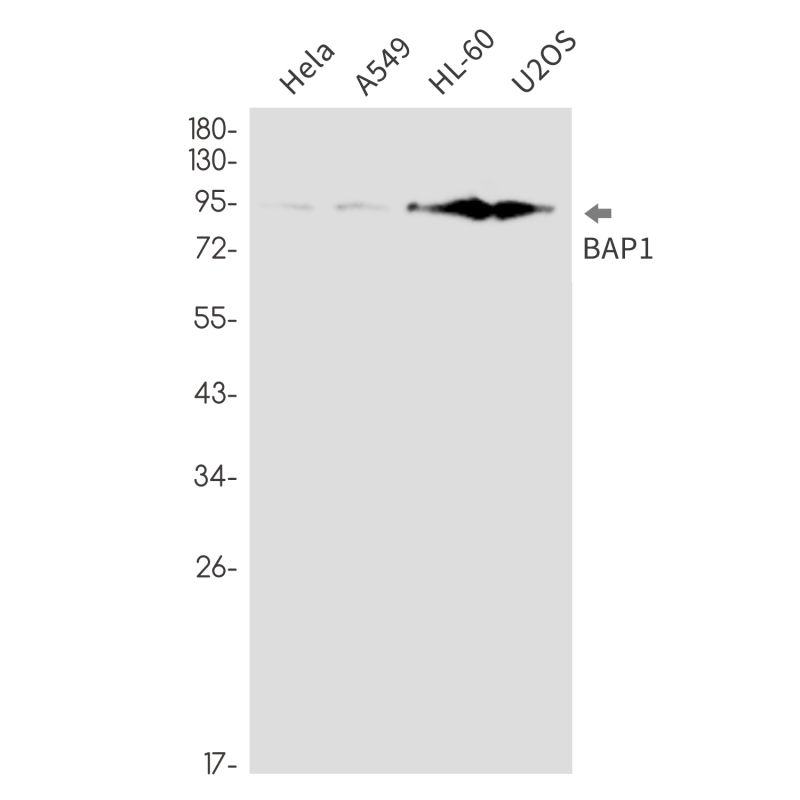
| WB | 1/500-1/1000 | Human,Mouse,Rat |
| IF | 咨询技术 | Human,Mouse,Rat |
| IHC | 咨询技术 | Human,Mouse,Rat |
| ICC | 技术咨询 | Human,Mouse,Rat |
| FCM | 咨询技术 | Human,Mouse,Rat |
| Elisa | 咨询技术 | Human,Mouse,Rat |
| Aliases | UCHL2; hucep-6; HUCEP-13 |
| Entrez GeneID | 8314 |
| WB Predicted band size | Calculated MW: 80 kDa; Observed MW: 95 kDa |
| Host/Isotype | Rabbit IgG |
| Antibody Type | Primary antibody |
| Storage | Store at 4°C short term. Aliquot and store at -20°C long term. Avoid freeze/thaw cycles. |
| Species Reactivity | Human |
| Immunogen | Recombinant protein of human BAP1 |
| Formulation | Purified antibody in TBS with 0.05% sodium azide,0.05%BSA and 50% glycerol. |
+ +
以下是3-4篇关于BAP1抗体的参考文献及其摘要内容:
1. **文献名称**: "BAP1 Immunohistochemistry Predicts Outcomes in Uveal Melanoma"
**作者**: Harbour JW, et al.
**摘要**: 该研究验证了BAP1抗体在葡萄膜黑色素瘤中的免疫组化应用,发现BAP1蛋白表达缺失与患者预后不良及转移风险显著相关,可作为独立的预后标志物。
2. **文献名称**: "BAP1 Loss by Immunohistochemistry Predicts Survival in Mesothelioma"
**作者**: Yoshikawa Y, et al.
**摘要**: 研究通过BAP1抗体免疫组化分析间皮瘤样本,发现BAP1蛋白缺失与患者较长生存期相关,提示其可作为区分恶性间皮瘤与其他胸膜疾病的重要辅助标记。
3. **文献名称**: "BAP1 Germline Mutations and Tumor Predisposition: Utility of BAP1 Antibody Screening"
**作者**: Carbone M, et al.
**摘要**: 文章探讨了BAP1抗体在识别遗传性BAP1突变相关肿瘤(如间皮瘤、葡萄膜黑色素瘤)中的应用,强调其在临床筛查和家族遗传咨询中的价值。
4. **文献名称**: "BAP1 Protein Loss by Immunohistochemistry in Renal Cell Carcinoma"
**作者**: Joseph RW, et al.
**摘要**: 该研究评估了BAP1抗体在肾透明细胞癌中的表达,发现BAP1蛋白缺失与高级别肿瘤和不良预后相关,支持其在肾癌分子分型中的作用。
(注:以上文献信息为示例性内容,实际引用需核对具体文献。)
The BAP1 (BRCA1-associated protein 1) antibody is a critical tool in studying the BAP1 tumor suppressor gene, which encodes a nuclear deubiquitinase involved in chromatin modification, DNA repair, and cell cycle regulation. Discovered in 2010. BAP1 mutations are linked to cancer susceptibility syndromes and various malignancies, including uveal melanoma, malignant mesothelioma, renal cell carcinoma, and cholangiocarcinoma. The BAP1 protein interacts with key regulators like BRCA1. ASXL1. and histone H2A, influencing gene expression and genomic stability.
BAP1 antibodies are widely used in research and diagnostics to detect BAP1 protein expression loss, often caused by inactivating mutations or deletions. Immunohistochemistry (IHC) with BAP1 antibodies helps distinguish BAP1-deficient tumors (e.g., mesothelioma vs. reactive mesothelial hyperplasia) and guides prognosis, as BAP1 loss correlates with aggressive behavior in some cancers. In hereditary settings, germline BAP1 mutations predispose individuals to the "BAP1 cancer syndrome," characterized by multiple tumor types. Antibody-based assays thus aid in both tumor classification and genetic counseling.
Validation of BAP1 antibodies is crucial due to varying specificity across tissue types. Their application extends to mechanistic studies, exploring BAP1's role in epigenetic regulation, apoptosis, and metabolic pathways. Ongoing research aims to clarify BAP1's therapeutic potential as a biomarker or target in precision oncology.
×